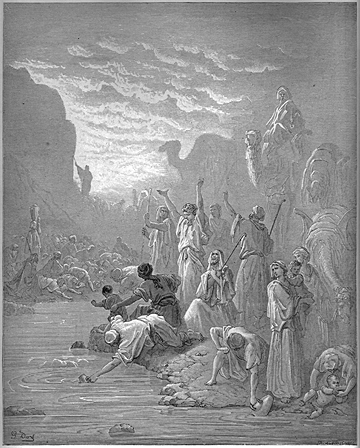Exodus 17
1 Obeying what Yahweh commanded, all the Israeli people moved from the Sin Desert. They/We traveled from one place to another. They/We camped at [a place named] Rephidim, but there was no water there for (the people/us) to drink.
Ungano yose yavaIsraeri yakasimuka kubva paRenje reSini, vachifamba nzvimbo nenzvimbo sokurayira kwaJehovha. Vakadzika musasa paRefidhimu, asi pakanga pasina mvura yokuti vanhu vanwe.
2 So the people complained to Moses/me again, saying, “Give us water to drink!” Moses/I replied to them, “Why are you (criticizing/arguing with) me [RHQ]? And why are you trying to determine whether Yahweh [has the power to provide for you]?”
Saka vanhu vakakakavadzana naMozisi uye vakati, “Tipe mvura tinwe.” Mozisi akapindura akati, “Seiko muchikakavadzana neni? Seiko muchiedza Jehovha?”
3 But the people were very thirsty, and they continued to complain to Moses/me. They were saying things like “Why did you bring us out of Egypt?”, and “Did you bring us here to cause us and our children and livestock to die (from thirst/because we had no water to drink) [RHQ]?”
Asi vanhu vakanga vane nyota yemvura ipapo, saka vakapopotedzana naMozisi. Vakati, “Seiko wakatibudisa muIjipiti kuti isu navana vedu nezvipfuwo zvedu tife nenyota?”
4 So Moses/I prayed earnestly to Yahweh. He/I said, “(How shall I deal with these people?/I do not know how to deal with these people!) [RHQ] They are almost ready to [kill me by throwing] stones at me!”
Ipapo Mozisi akachema kuna Jehovha akati, “Ndoiteiko navanhu ava? Votoda kunditaka namabwe.”
5 Yahweh replied to Moses/me, “Take some of the elders/leaders of the Israeli people with you and [tell the rest of] the people to follow you [to Sinai Mountain]. Take along the stick with which you struck the Nile [River].
Jehovha akapindura Mozisi akati, “Famba pamberi pavanhu. Tora vamwe vavakuru vavaIsraeri uye ubate muruoko rwako tsvimbo yawakarova nayo mvura yeNairi, ugoenda.
6 Listen carefully: I will stand in front of you on top of a [large] rock at the foot of the mountain. Strike the rock with your stick. [When you do that], water for the people to drink will flow out of the rock.” [When they/we arrived at the mountain], Moses/I did that while the Israeli elders were watching, [and water flowed from the rock].
Ndichamira ipapo pamberi pako padombo riri paHorebhi. Urove dombo, uye mvura ichabuda pariri, kuti vanhu vanwe.” Saka Mozisi akaita izvi pamberi pavakuru vavaIsraeri.
7 Moses/I gave that place two names [in the Hebrew language: ] Massah, [which means ‘testing’], and Meribah, [which means ‘complaining’]. He/I gave it the name Massah because the Israeli people were testing Yahweh, saying “Is Yahweh really among us [and able to help us], or not?”, and he/I gave it the name Meribah because they were [continually] complaining.
Uye akatumidza nzvimbo iyi kuti Masa neMeribha nokuti vaIsraeri vakakavadzana naye uye nokuti vakaedza Jehovha vachiti, “Ko, Jehovha ari pakati pedu here kana kuti kwete?”
8 Then the descendants of the Amalek people-group came and fought against the Israeli people at Rephidim.
VaAmareki vakauya vakarwa navaIsraeri paRefidhimu.
9 Moses/I said to Joshua, [who was one of our army/Israeli leaders], “Choose some men to go out and fight against the Amalek people-group tomorrow. I will stand on the top of the hill, holding the stick that God told me to carry.”
Mozisi akati kuna Joshua, “Sarudza vamwe varume vokwedu ugobuda kundorwa navaAmareki. Mangwana ndichandomira pamusoro pechikomo ndine tsvimbo yaMwari mumaoko angu.”
10 So Joshua did what Moses/I told him to do. He took some men to fight against the Amalek people-group. [While they were fighting], Aaron, Hur, and Moses/I went up to the top of the hill [so that they/we could see the whole battle area].
Saka Joshua akarwa navaAmareki sokurayirwa kwaakaitwa naMozisi, uye Mozisi, Aroni naHuri vakakwira pamusoro pechikomo.
11 Whenever Moses/I lifted up his/my arms, the Israeli men started to win [the battle]. And whenever he/I lowered his/my arms, the Amalek people-group started to win.
Mozisi paainge akasimudza maoko ake, vaIsraeri vaikunda, asi paaingoderedza maoko ake, vaAmareki vaikunda.
12 But his/my arms became tired. So Aaron and Hur [rolled] a [large] stone for Moses/me to sit on. [While he/I was sitting on it], those two held up his/my arms, [one on one side and the other on the other side]. In that way, they kept his/my arms lifted up, and his/my arms held steady until the sun went down.
Maoko aMozisi akati aneta, vakatora dombo ndokuriisa pasi pake iye akagara pamusoro paro. Aroni naHuri vakabata maoko ake vakamutsigira, mumwe kuno rumwe rutivi, mumwe kuno rumwe rutivi, kuitira kuti maoko ake arambe akatsiga kusvikira madekwana.
13 So Joshua and the men with him completely defeated the Amalek people-group, using their swords [to fight against them].
Saka Joshua akakunda hondo yavaAmareki nomunondo.
14 Then Yahweh said to Moses/me, “Write an account of this battle, and then read it to Joshua. [Also write that some day] I will completely get rid of the Amalek people-group.”
Ipapo Jehovha akati kuna Mozisi, “Nyora izvi mubhuku chive chinhu chicharangarirwa uye uve nechokwadi kuti Joshua azvinzwa, nokuti ndichabvisa chirangaridzo chose cheAmareki pasi pedenga.”
15 Then Moses/I built a [stone] altar there and named it ‘Yahweh is [like] my flag’.
Mozisi akavaka aritari akaitumidza kuti “Jehovha ndiye Mureza wangu.”
16 He/I said, “Hold high Yahweh’s flag! Yahweh will continue to fight against the Amalek people-group (forever/in all future generations)!”
Akati, “Nokuti maoko akasimudzirwa kumusoro kuchigaro choushe chaJehovha. Jehovha acharwa neAmareki kubva kune chimwe chizvarwa kusvikira kune nechimwe chizvarwa.”





















